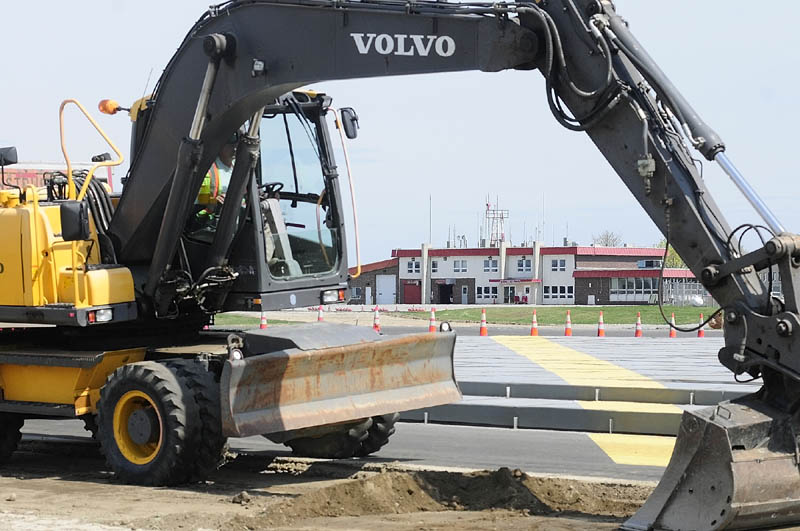AUGUSTA — The Augusta State Airport’s main runway will be closed for reconstruction during most or all of May and June, suspending airline Cape Air’s flights there until the work is done, airport officials said.
The airport will remain open, however, with private and charter pilots using the shorter alternate runway at the airport while reconstruction work takes place on the main landing strip.
While private and charter planes will be able to use the 2,700-foot “crosswinds” runway, Cape Air’s commercial flights need at least 3,200 feet of runway.
“The usable length of runway that will be left is just not long enough,” said Andrew Bonney, vice president of planning for Massachusetts-based Cape Air. “Safety has always been paramount in Cape Air’s operations. Given that this work needs to be done, we don’t really have a choice but to suspend operations. As soon as the runway reopens, we’ll be ready to fly.”
The $7.5 million safety improvement project at the airport, which is owned by the state but run by the city, began last fall. After halting for the winter season, work resumed last week, and about 1,500 feet of one end of the main runway has already been torn up by workers from contractor Pike Industries.
“It’s a major project, and much needed for the airport,” said Airport Manager John Guimond. “It has been 40 years since any major reconstruction of the runway has been done.”
Cape Air’s flights between Augusta and Boston are expected to be halted when the rest of the main runway is closed May 1. Cape’s Augusta flights will remain suspended until the 5,100-foot main runway reopens, which Guimond said would be by June 30.
Bonney said passengers who would normally fly in or out of Augusta may, during that time period, fly with Cape out of Rockland, where it also offers flights to Boston. Bonney said Guimond and other airport staff memebrs have been exceptional in communicating with the airline about the coming runway closure.
Bonney said Cape’s Augusta employees, who number between nine and 11 depending on the season, will continue to work even when the flights are suspended.
“We’ll keep all our employees busy with one assignment or another, including taking reservation calls at the airport,” he said. “We care very deeply about keeping all our employees on the clock.”
Bonney said other than the pending runway closure, things are going well for Cape since it became the commercial carrier at Augusta. During the first quarter of 2012, he said, its passenger count increased by 16 percent, from 1,798 for the first quarter of last year to 2,081 this year.
Maintenance work is under way on the airport’s alternate runway, which is marked on both ends with large yellow “X” signs to indicate it’s closed. It will be reopened by the time the main runway closes, allowing the airport to remain open throughout the construction project, Guimond said.
David Smith, chief pilot for Maine Instrument Flight, which provides charter flights and services to private pilots, said his company will continue to operate out of Augusta during the main runway closure.
“We’ll still be 100 percent operational,” Smith said. “All our airplanes require less runway than Cape Air does. Our twin-engine planes are capable of operating off a fairly short amount of pavement.”
The project includes the installation of new lights and navigational aids by Moulison North.
The entire main runway will be ground up, reclaimed and repaved by Pike. The new main runway will be 50 feet narrower, going from 150 to 100 feet.
Glen Altimari, resident project representative for Hoyle Tanner and Associates, the construction engineering consultant on the project, said the runway width is determined by Federal Aviation Administration standards. He said Augusta doesn’t need as wide a runway as it has because it doesn’t have large planes flying into the airport. He said a wider runway requires more maintenance.
The runway reconstruction was originally planned for last summer, but anticipated federal funding for the project was delayed, forcing it to be put off until this spring.
Guimond said 95 percent of the project will be paid for with federal grant funds, with the remaining 5 percent coming from the state.
The project is not expected to affect car and truck traffic on local roads.
Keith Edwards — 621-5647
kedwards@centralmaine.com
Send questions/comments to the editors.



Success. Please wait for the page to reload. If the page does not reload within 5 seconds, please refresh the page.
Enter your email and password to access comments.
Hi, to comment on stories you must . This profile is in addition to your subscription and website login.
Already have a commenting profile? .
Invalid username/password.
Please check your email to confirm and complete your registration.
Only subscribers are eligible to post comments. Please subscribe or login first for digital access. Here’s why.
Use the form below to reset your password. When you've submitted your account email, we will send an email with a reset code.